| Resources |
| Links of Interest |
Download CDs
|
System Requirements
* Checked by installer |
| Network |
Stand-alone or networked |
| IP Address |
Static or allocated using
DHCP: Issues related to dynamic and altering |
| Host Name |
Fully qualified name is not
longer than 255 characters |
| Processor
Type |
Pentium (32-bit) |
| Processor
Speed |
300MHz or faster |
| Memory * |
512MB |
| Disk Space * |
1.05GB for J2EE Server, Web
Server and Oracle SOA Suite |
| Space in /tmp |
400MB |
| Swap Space |
512MB |
| Monitor |
256 color display |
| Supported
Browsers |
- Microsoft Internet
Exploiter 6.0 SP2 (Windows only)
- Netscape 7.2
- Mozilla 1.7
- Firefox 1.0.4
- Safari 1.2, 2.0 (Apple
Macintosh)
|
|
|
| Operating System Installation and Configuration |
| Option instructions for RedHat 3 AS |
# Verify CPU
$ cat /proc/cpuinfo | grep name
# Verify CPU speed
$ cat /proc/cpuinfo | grep MHz
# Verify the Linux version
$ cat /etc/issue
# Verify the update is installed
$ cat /etc/redhat-release
# Verify kernel version is 2.4.21-138 (or later)
$ uname -r
# Verify packages are appropriate
# gcc-3.2.2-38 or later
# make-3.79 or later
# binutils-2.12
# openmotif-2.2.2-124
$ rpm -q gcc make binutils openmotif
# if a package is missing download it and install with:
# rpm -i <package_name>
# Verify the amount of RAM
$ grep MemTotal /proc/meminfo
# Verify the amount of swap space
$ grep SwapTotal /proc/meminfo
# Verify the amount of free disk space
$ df -h
# Verify /tmp space
$ df -k /tmp
# Verify monitor
$ /usr/X11R6/bin/xdpyinfo |
As root: Create DBA Group and Oracle User
Do this on all servers |
$ /usr/sbin/groupadd oinstall
$ /usr/sbin/groupadd dba
$ /usr/sbin/useradd -m -g oinstall -G dba oracle
$id oracle
$passwd oracle
-- set the password to oracle1
# Verify group membership
$ groups oracle
$ id nobody
-- if nobody does not exist then
$ /usr/sbin/useradd nobody |
As root: Create Installation Directories
Do this on all servers |
mkdir -p /app/oracle
chown -R oracle:dba /app/oracle
chmod -R 775 /app/oracle
mkdir /stage
chown -R oracle:dba /stage |
As root: Alter Kernel Parameters in sysctl.conf by appending the highlighted text.
Do this on all servers |
cd /etc
vi sysctl.conf
fs.file-max = 206173
kernel.shmall = 2097152
kernel.shmmax = 4294967295
kernel.shmmni = 4096
kernel.semopm = 100
#kernel.semmsl = 256
#kernel.semmni = 142
kernel.sem = 256 32000 100 142
kernel.msgmax = 8192
kernel.msgmnb = 65535
kernel.msgmni = 2878
net.core.rmem_default = 1048576
net.core.rmem_max = 1048576
net.core.wmem_default = 262144
net.core.wmem_max = 262144
net.ipv4.ip_forward = 0
net.ipv4.conf.default.rp_filter = 1
net.ipv4.ip_local_port_range = 1024 65000 |
-- Activate changes
/sbin/sysctl -p
Optional Verifications
# Verify parameters are correct
/sbin/sysctl -a | grep shm
/sbin/sysctl -a | grep sem
/sbin/sysctl -a | grep file-max
/sbin/sysctl -a | grep ip_local_port_range
. /proc/sys/kernel/sem
. /proc/sys/kernel/shmall
. /proc/sys/kernel/shmmax
. /proc/sys/kernel/shmmni
. /proc/sys/fs/file-max
. /proc/sys/net/ipv4/ip_local_port_range
. /proc/sys/net/core/rmem_default
. /proc/sys/net/core/rmem_max
. /proc/sys/net/core/wmem_default
. /proc/sys/net/core/wmem_max |
|
As root: Set Shell Limits
Do this on all servers |
cd /etc/security
-- Modify limits.conf
cat >> /etc/security/limits.conf <<EOF
oracle soft nproc 2047
oracle hard nproc 16384
oracle soft nofile 4096
oracle hard nofile 65536
EOF |
-- Modify login
--
must NOT be the last line in the file
session required /lib/security/pam_limits.so |
-- Modify Console/X Windows
cat
>> /etc/pam.d/xdm <<EOF
session required pam_limits.so
EOF |
|
As root: Change Default Profile
Do this on all servers |
cd /etc
-- if Bourne, Korn or Bash shell
cat >> /etc/profile <<EOF
if [ \$USER = "oracle" ]; then
if [ \$SHELL = "/bin/ksh" ]; then
ulimit -p 16384
ulimit -n 65536
else
ulimit -u 16384 -n 65536
fi
fi
EOF
|
-- if C shell
cat >> /etc/csh.login <<EOF
if ( \$USER == "oracle" ) then
limit maxproc 16384
limit descriptors 65536
end if
EOF
|
|
| Verify Ports in use |
#
By default Oracle's HTTP Server uses port 7777
$ netstat -an | grep 77
# To use custom port numbers create a
staticports.ini file
Oracle HTTP Server port = <port_num>
Oracle HTTP Server SSL port = <port_num>
Oracle Notification Server Request port = <port_num>
Oracle Notification Server Local port = <port_num>
Oracle Notification Server Remote port = <port_num>
ASG port = <port_num>
# There is a file template at Disk_1:mount_point/stage/Response/
|
As root: Append servers to hosts file
Do this on all servers |
cd /etc
vi hosts
| 192.168.1.254 |
bigdog |
bigdog.psoug.org |
-- ping all hosts (substitute actual node names for the "omega")
ping 192.168.1.1
ping www.oracle.com
ping omega1
ping omega1.psoug.org
|
| Modify .bashrc |
# cd
/home/oracle
vi .bashrc
-- append the following:
# User specific aliases and functions
# Source global definitions
if [ -f /etc/bashrc ]; then
. /etc/bashrc
fi
umask 022
ORACLE_BASE=/app/oracle
ORACLE_HOME=/app/oracle/OraHome_1
ORACLE_SID=
OPMN_HOME=/app/oracle/OraHome_1/opmn
TMP=/tmp
TEMP=/tmp
TMPDIR=/tmp
PATH=$ORACLE_HOME/bin:$OPMN_HOME/bin:$PATH
export PATH ORACLE_BASE ORACLE_HOME ORACLE_SID TMP TEMP TMPDIR
|
|
| Prepare files for
installation |
--
as UNIX user Oracle
$ cd /stage
$ ls -al
$ cpio -idv < as_linux_x86_101300_disk1.cpio
$ cpio -idv < as_linux_x86_101300_disk2.cpio
$ cpio -idv < as_linux_x86_101300_disk3.cpio
$ cpio -idv < as_linux_x86_101300_disk4.cpio
$ ls -al |
| Installation |
--
as UNIX user Oracle
$ cd /stage
$ ls -al
$ cd Disk1
$ ls -al
$ ./runInstaller |
| |
| Screen 1: Welcome |
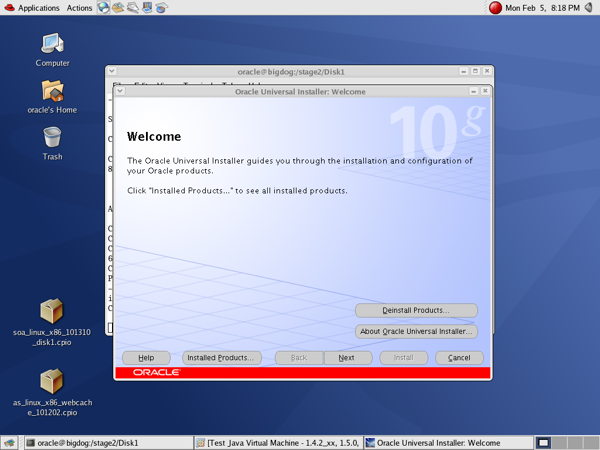 |
| Screen 2: Inventory
Directory and Credentials |
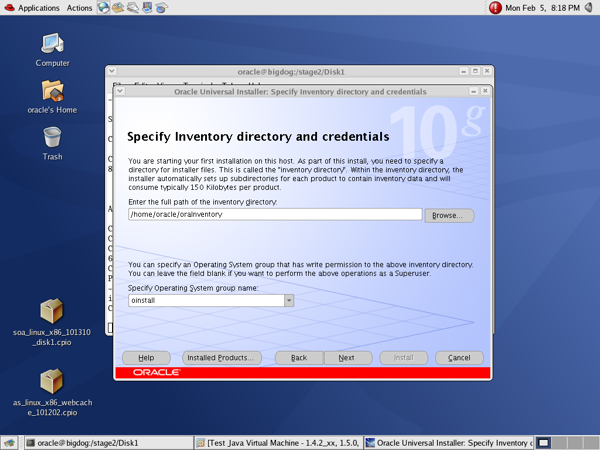 |
| Screen 3: Run
orainstRoot.sh |
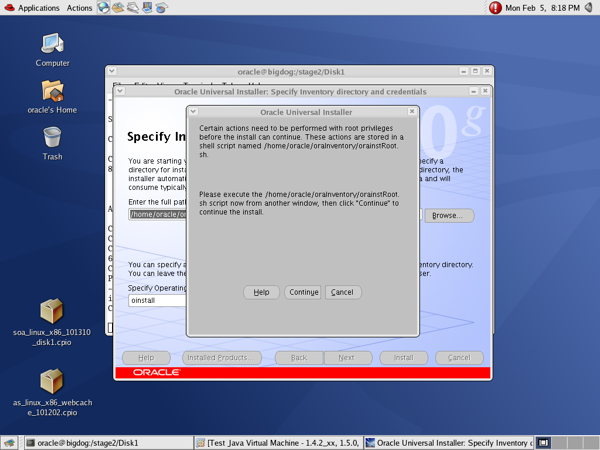 |
| Screen 4: File Locations |
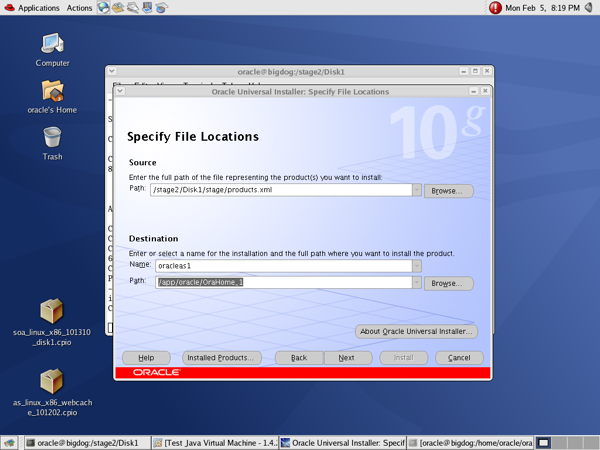 |
| Screen 5: Product to
Install |
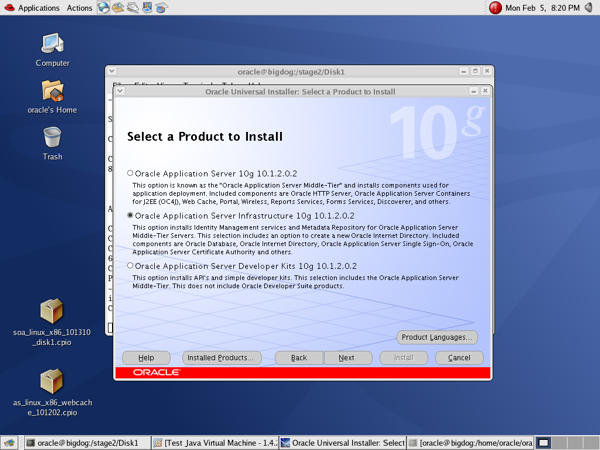 |
| Screen 6: Installation
Type |
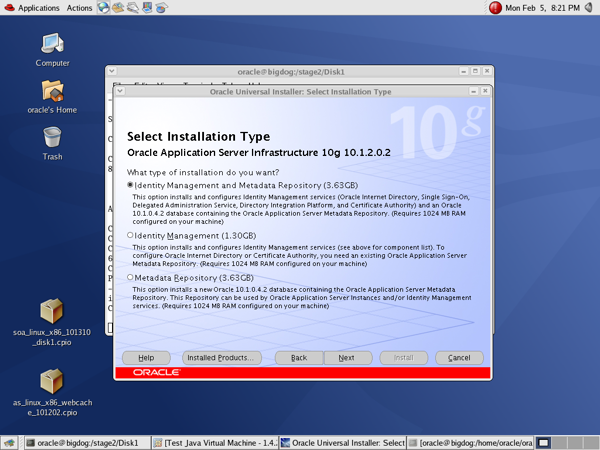 |
| Screen 7: Configuration
Options |
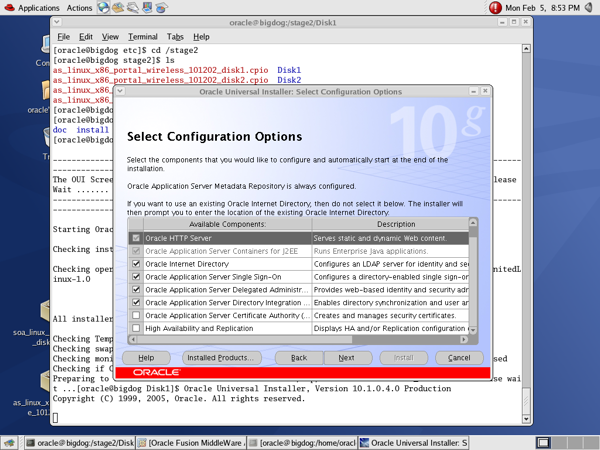 |
| Screen 8: Port
Configuration |
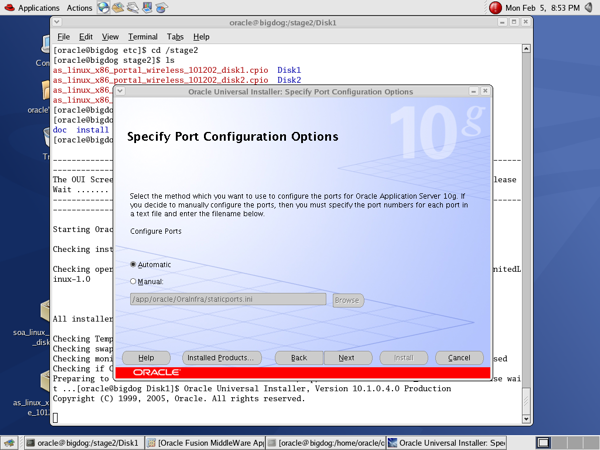 |
| Screen 9: Namespace
Configuration |
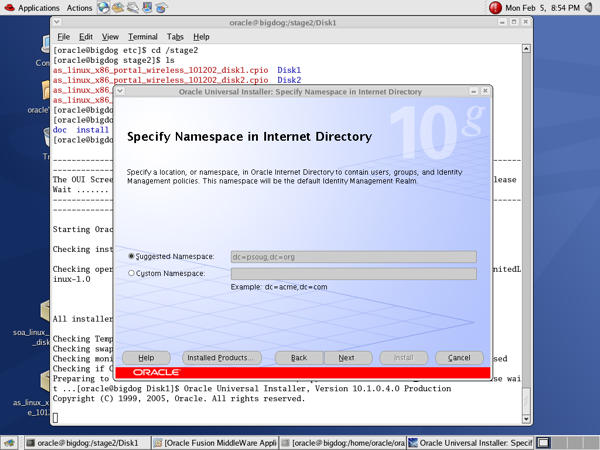 |
| Screen 10: Repository
Database Configuration |
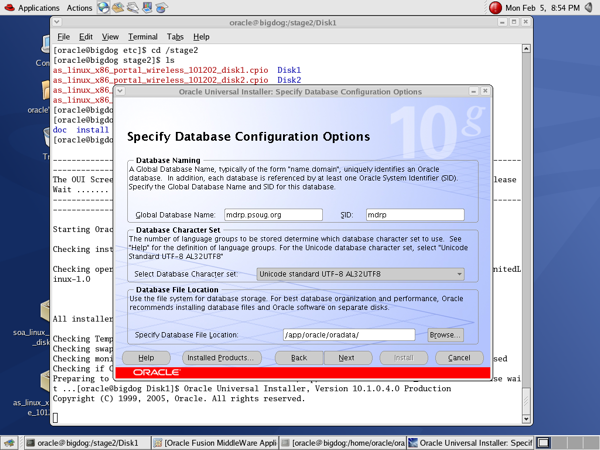 |
| Screen 11: Repository
Database Passwords |
 |
| Screen 12: Application
Server Instance Name and Password |
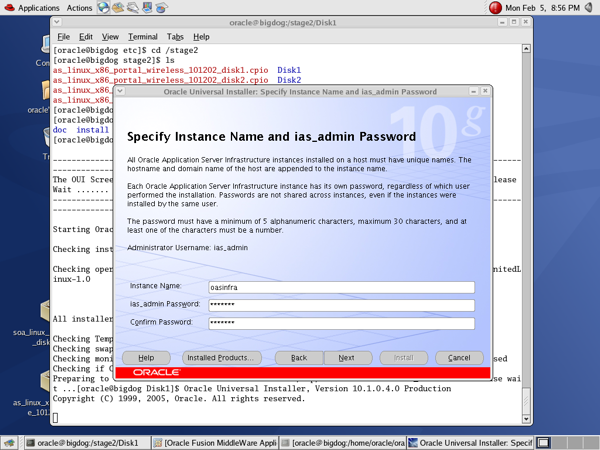 |
| Screen 13: Installation
Summary |
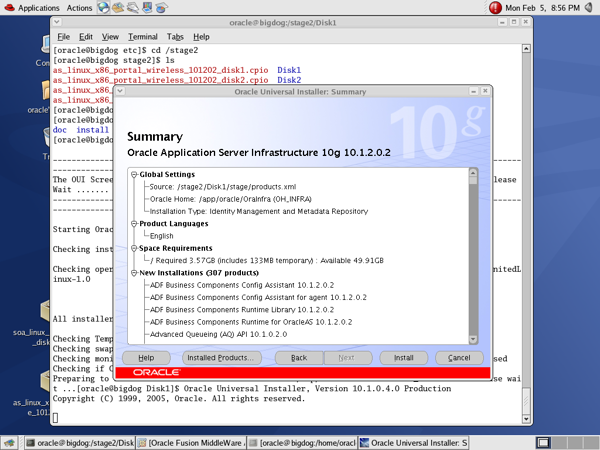 |
| Screen 14: Installation |
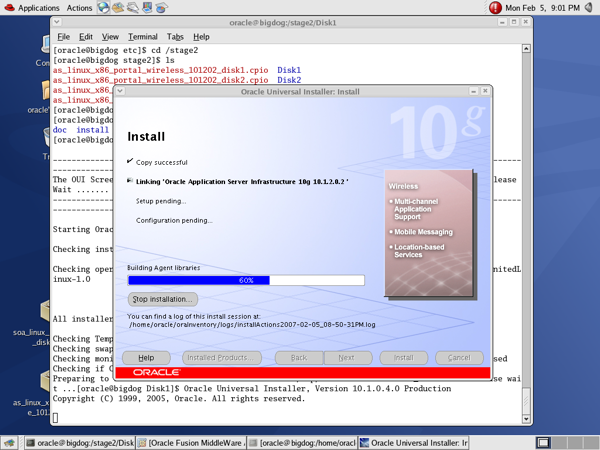 |
| Screen 15: root.sh |
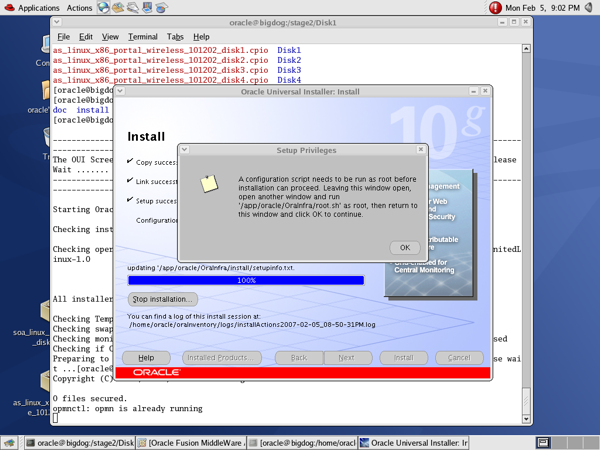 |
| Screen 16: root.sh after
running |
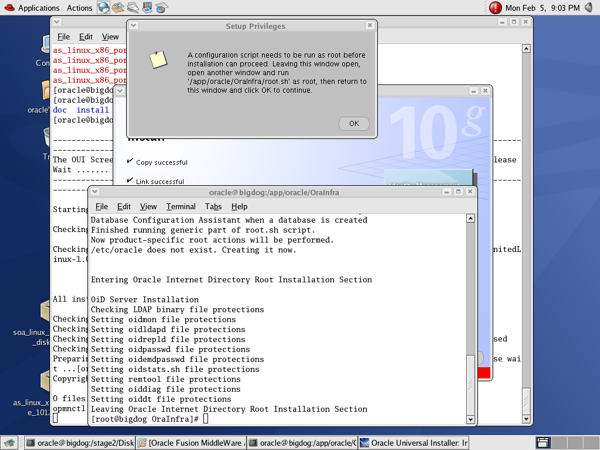 |
| |
| After
Installation |
| Verify Installation |
#
Verify assigned ports
# $ ORACLE_HOME/opmn/bin/opmnctl startall
$ opmnctl status -l
-- root directory
$ cd /
$ ls -al
-- Oracle home directory
$ cd $ORACLE_HOME
$ ls -al
-- inventory directory
$ HOME ?
$ ls -al
-- information on Oracle homes
$ cd /etc
$ ls -al
-- installer files only needed during
installation
$ cd /tmp
$ ls -al
|
| Metadata Repository
Review |
$ cd /app/oracle/OraHome_1/oradata
$ ls -al
$ sqlplus / as sysdba
set linesize 121
col username format a20
col account_status format a20
col dtsp format a20
col ttsp format a20
SELECT username, account_status, default_tablespace DTSP,
temporary_tablespace TTSP, profile
FROM dba_users
ORDER BY 1;
col program format a20
col state format a20
col service_name format a20
SELECT sid, username, status, program, type, state, service_name
FROM gv$session;
|